Fintech and the Future of Financial Operations in Short-Term Rentals
Financial technology is redefining how Short-Term Rental managers operate. This article explores how fintech tools—from virtual cards to automated expense tracking—are powering smarter, faster, and more scalable financial workflows in the STR industry.
June 3, 2025
Corey
.png)
Redefining Financial Management in STRs
Financial technology—commonly known as fintech—continues to reshape industries worldwide. At its core, fintech represents the application of advanced digital tools, data-driven solutions, and API connectivity to solve longstanding financial challenges. In verticals like eCommerce, SaaS, and small business accounting, the adoption of fintech has fueled remarkable gains in efficiency, real-time visibility, and financial control. Automated payments, expense management, reconciliations, and rapid onboarding of new financial products have become the norm—not the exception.

Now, these advancements are beginning to have a profound impact on Short-Term Rental (STR) operators and property management companies. An industry long reliant on spreadsheets, manual reconciliations, and legacy bank statements is encountering fresh opportunities to reimagine the financial backbone of its operations.
The Current Landscape: Challenges in Traditional STR Financial Operations
Despite rapid growth, the STR industry has historically been underserved by mainstream financial platforms. Property managers juggle complex cash flows: handling owner funds, processing guest payments via OTAs, paying vendors, reimbursing team members, and maintaining compliance with trust accounting rules. In most organizations, these workflows are hindered by:
- Heavy dependence on spreadsheets for expense allocations, owner statements, and transaction categorizations
- Manual reconciliation of OTA payouts split across multiple properties and owners
- Basic bank feeds with limited data granularity and slow updates
- Time-consuming owner payout processes vulnerable to errors and delays
- Limited controls over spend, increasing risks of misallocated or unapproved expenses
The result is unnecessary friction, operational inefficiency, increased compliance risk, and—particularly under trust accounting regulations—a potential threat to owner and guest trust.
Fintech Innovation Arrives in the STR Space

Leading fintech platforms have redefined how modern businesses manage and move money. Instead of one-size-fits-all bank accounts and generic credit cards, fintech delivers dynamic, software-driven solutions built for operational complexity. Today, these core fintech innovations are transforming STR companies:
Virtual Cards: Precision and Control at the Property Level
Unlike traditional cards tied to a single business checking account, virtual cards (such as cards provided by Ramp) can be instantly created, assigned, and managed per property, team member, or expense type. For STR operators, this unlocks several advantages:
- Granular Spend Tracking: Every transaction is linked directly to a property, vendor, or activity, eliminating ambiguity at reconciliation time.
- Dynamic Spend Controls: Set spending limits, block unapproved merchants, or restrict card use to set times, reducing risk of fraud or unauthorized purchases.
- Automated Categorization: Expenses are automatically categorized and mapped to the correct property, saving hours of manual review and boosting owner statement accuracy.
For example, a maintenance technician can be issued a virtual card limited to repair supplies at approved vendors, valid only for a set budget each month. Every charge is instantly attributed to the correct property and owner ledger.
Real-Time Transaction Feeds and Automated Reconciliation
Traditional bank and credit card feeds often suffer from delays, unclear descriptors, and minimal metadata. With API-powered fintech platforms, STR operators can now see transactions in real time. This means:
- Faster, more accurate reconciliation of expenses and incoming OTA payouts.
- Immediate visibility into property-level cash flow, enabling data-driven decisions and rapid response to anomalies.
- Fewer gaps and delays when preparing owner statements, tax reports, or trust account reconciliations.
The standard for financial operations is shifting from "review at month-end" to "monitor and manage in real time." Such transparency is foundational for both compliance and owner trust.
Automated Expense Workflows and Property-Level Controls
Modern fintech solutions offer rule-based workflows that mirror the complex needs of STR businesses. For instance, approved vendor payments, recurring utility bills, and cleaning services can be automatically coded, split, or approved based on property, owner, or contract. This helps solve:
- Expense allocation headaches across multiple owners or properties.
- Inconsistent categorization that undermines reporting accuracy.
- Labor-intensive approval chains and audit bottlenecks.
By automating these financial tasks, managers reduce errors, eliminate manual work, and preserve the documentation and audit trails required for trust accounting compliance.
The Power of Integration: Fintech Meets STR Financial Management Platforms

While fintech platforms bring game-changing features on their own, their true power is unlocked through integration with STR-specific financial management systems. As the industry matures, we are witnessing a natural convergence:
Imagine a workflow where every virtual card transaction, vendor bill, and OTA payout is automatically pulled into a unified ledger. Each transaction is assigned at the property and owner level, feeding seamlessly into trust accounting reports and owner statements—without manual entry or reconciliation. Property managers can issue, manage, and track spend at scale, with uncompromising compliance and full audit-ability.
Platforms like Clearing are purpose-built to centralize, automate, and simplify these workflows for STR professionals. While specific integrations continue to evolve across the sector, one thing is clear: the future of STR financial management is deeply connected, automated, and dynamic.
Looking Forward: Empowering Property Managers for a New Era
Fintech is only beginning to realize its potential in the Short-Term Rental sector. As adoption accelerates, property managers and their accounting teams stand to benefit from:
- Greater visibility and real-time insights across their portfolios.
- Simplified compliance with even the most stringent trust accounting requirements.
- Reduced manual workload and fewer opportunities for costly errors.
- Improved owner transparency and trust.
Tomorrow’s most successful STR businesses will be those that thoughtfully build out their financial tech stacks—prioritizing not just operational speed, but also visibility, audit-ability, and accountability. By embracing modern fintech tools today, you lay the foundation for scalable, resilient, and trusted financial operations that delight both owners and guests.
Ready to future-proof your STR financial workflows and see how integrated fintech can power your growth?
Book a demo with Clearing and explore the possibilities firsthand.
Clearing is a Financial Technology Company, not a bank.


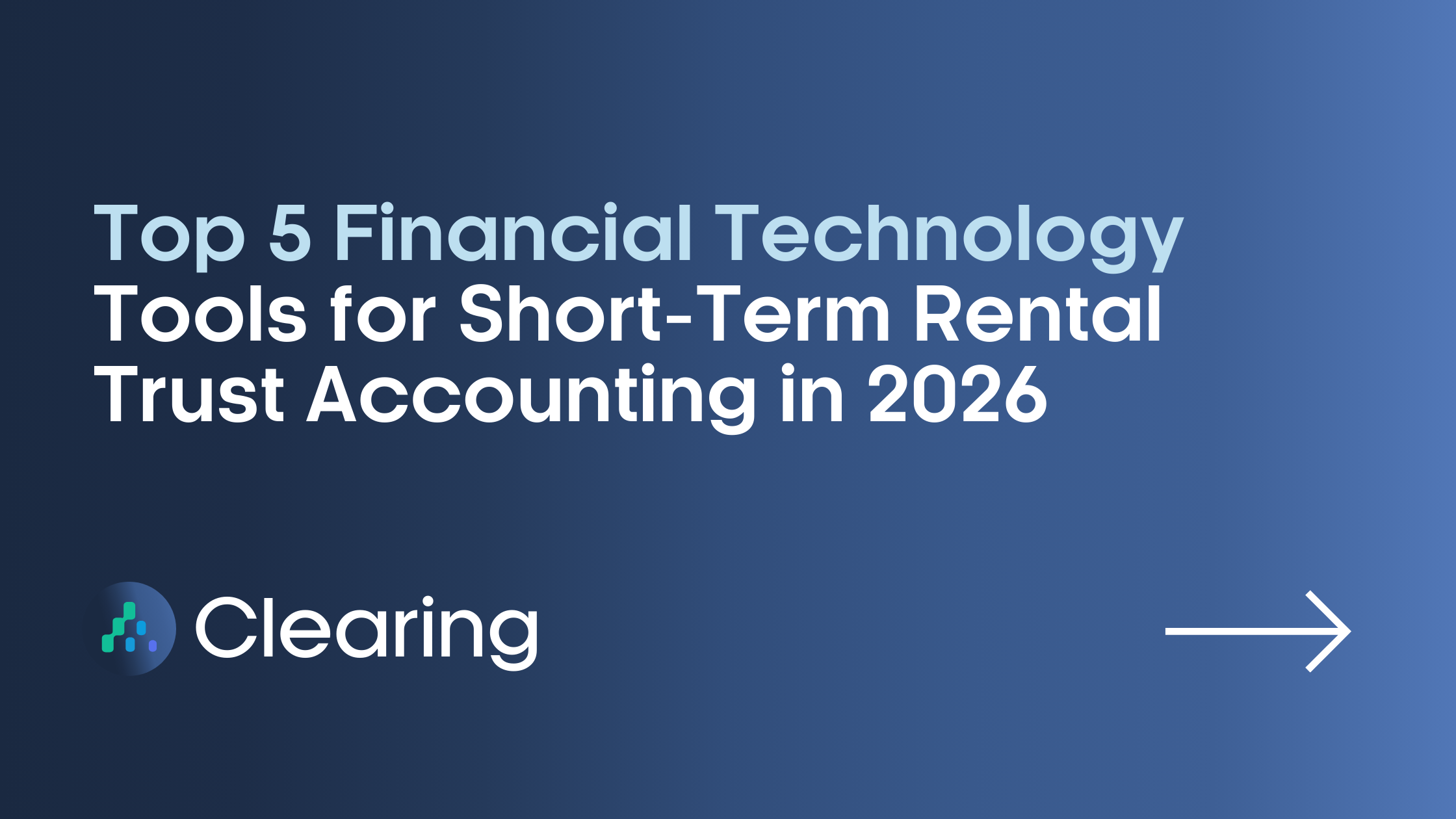

.png)
.png)
.png)
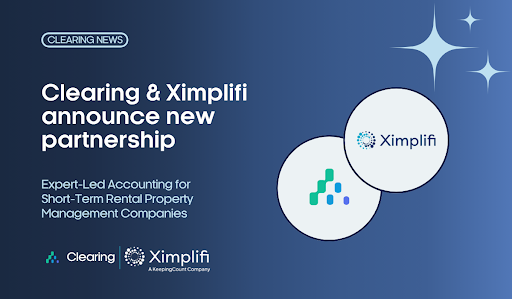
.png)
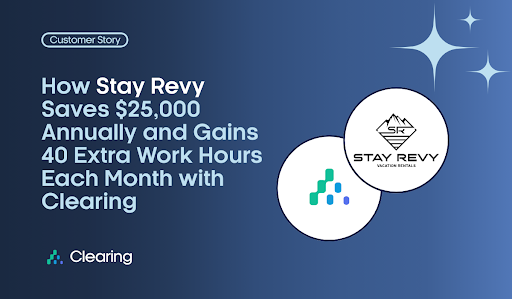
.png)
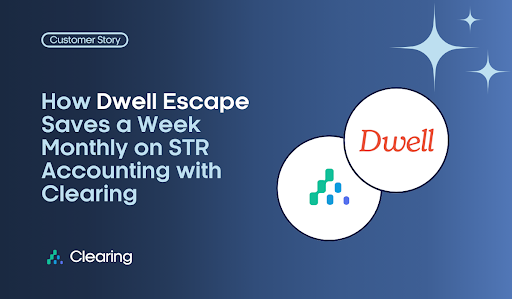
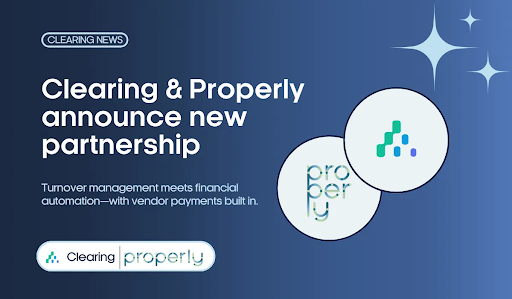
.png)
.png)
.png)
%20(1).png)
%20(1).png)
%20(1).png)
.png)
%20(2).png)
%20(1).png)
%20(1).png)
.png)

.png)
.png)
%20(1).png)
.png)
.png)
.png)
.png)
.png)
.png)
.png)
%20(1).png)
.png)
.png)
.png)
%20(1).png)
%20(1).png)
%20(1).png)








.jpg)
%20(1).png)
%20(1).png)
%20(2).png)
%20(1).png)

%20(1).png)
%20(1).png)
%20(1).png)



%20(1).png)
%20(1).png)
%20(1).png)
%20(1).png)
%20(1).png)


%20(1).png)
%20(1).png)
%20(1).png)
%20(2).png)
%20(2).png)



%20(2).png)


%20(2).png)
%20(1).png)
.png)


%20(2).png)
%20(2).png)

.jpg)
.png)
.png)
.png)



.png)

.png)
%20(1).png)
.png)